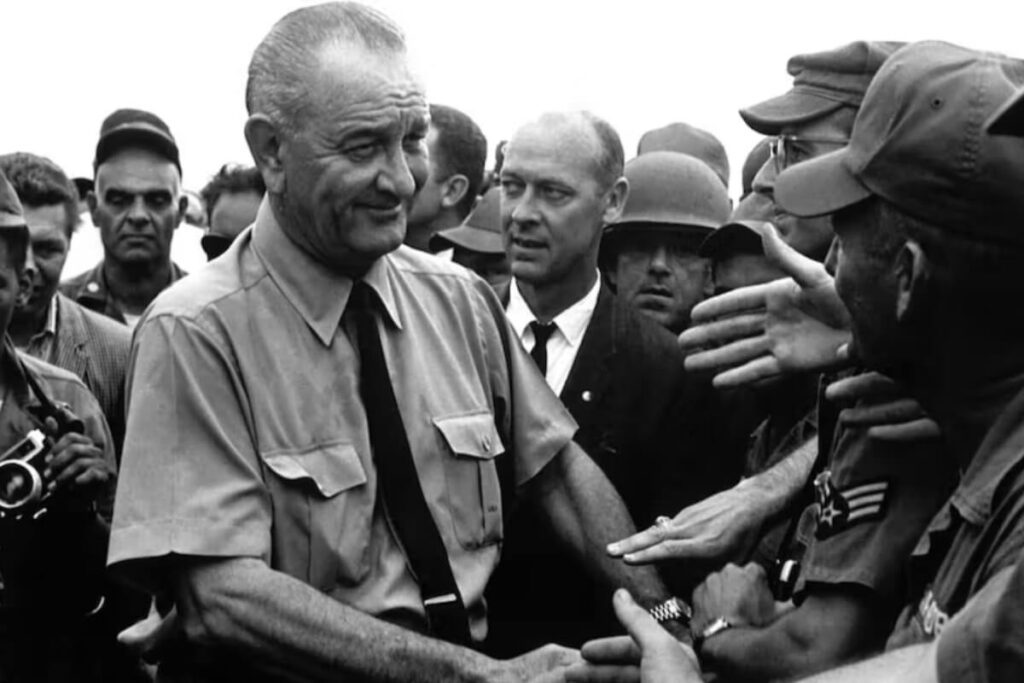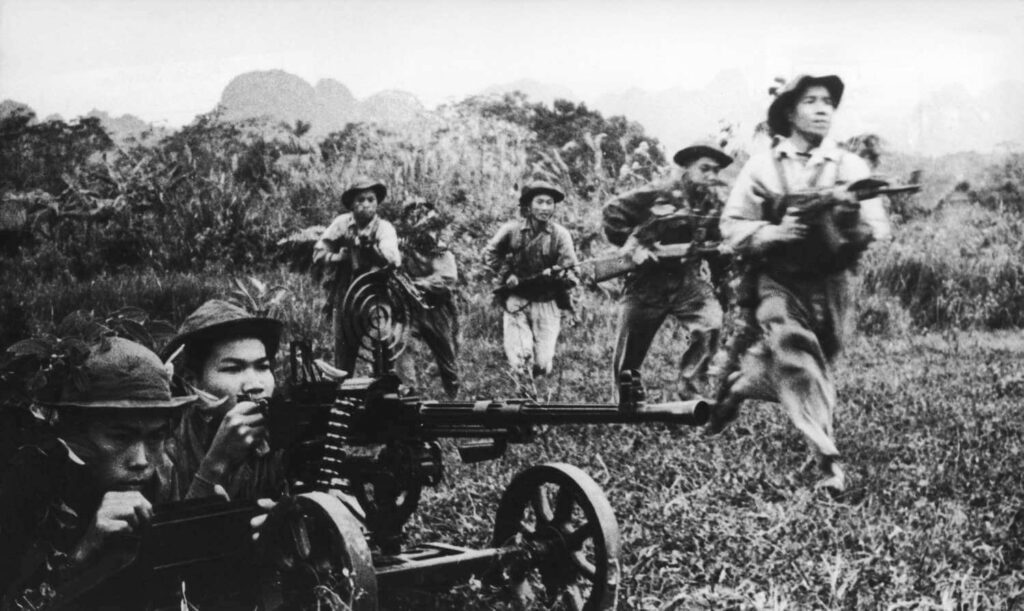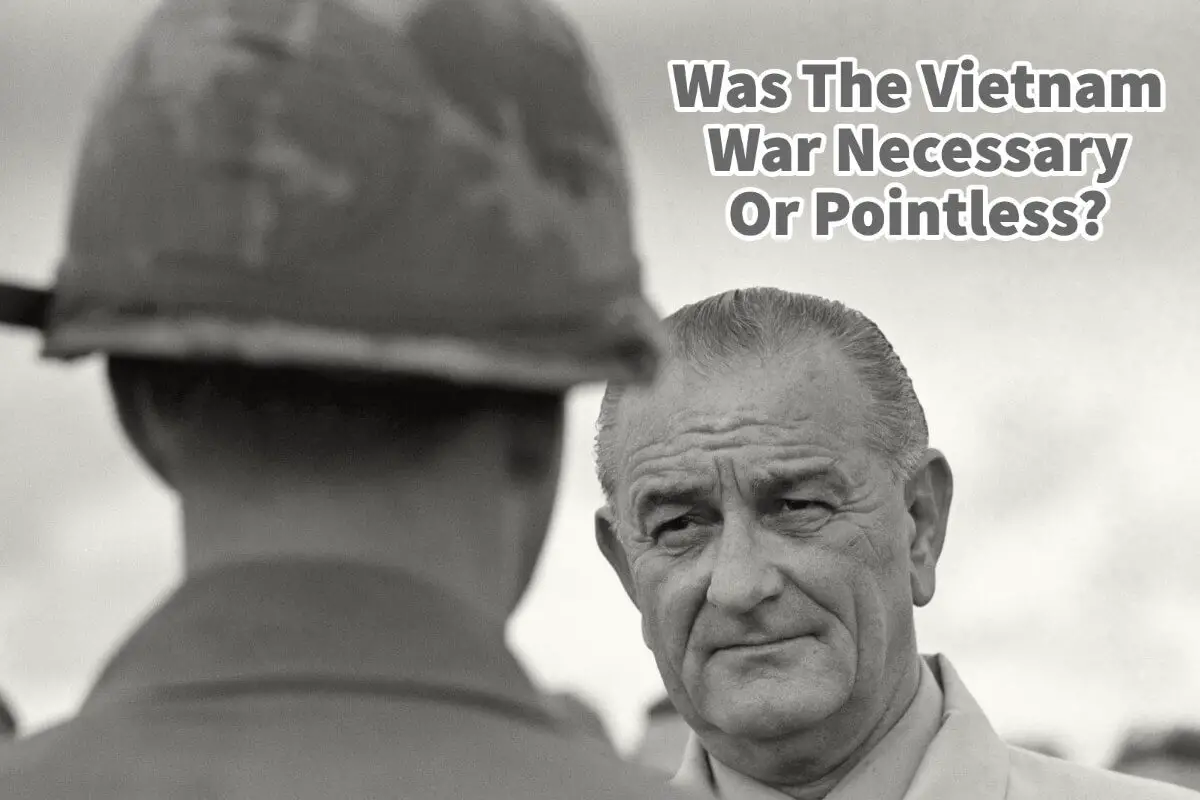One war that many Americans want to understand entirely is the Vietnam War; they want to know if the war was necessary or if war was pointless.
The Vietnam War was unnecessary and pointless; history has shown that America should not have been involved in the Vietnam conflict. There were several main reasons why America was in the war. Still, one was the perceived nuclear threat and the spreading of communism or the domino theory that the American government used to justify the war.
Table of Contents
The Vietnam War Was Not Necessary And Was Pointless
Today, most people look at the Vietnam war and feel that the war was not necessary and was pointless. Most historians agree that the Vietnam War was unnecessary and that the United States should never have been involved.

In 1967, President Lyndon Johnson explained to the American public why the nation needed to increase its American presence in Vietnam. Pres Johnson spoke about how nuclear war could happen if the Americans did not support the Vietnam war.
He also told the American people that he believed in the Domino theory, which meant that if Vietnam fell to communism, so would the rest of Asia and most of the world.
Pres Lyndon Johnson said this to the American people to convince them as to why America needed to be involved in the Vietnam War, which he called the Vietnam Conflict when said:
“I am convinced that by seeing this struggle through now, we are greatly reducing the chances of a much larger war – perhaps a nuclear war.”
Pres lyndon Johnson
But most historians agreed that Pres Johnson’s alarm about Vietnam was unfounded. Here are some reasons why:
Vietnam Has No Nuclear Weapons

Pres Lyndon Johnson told the American people he was worried about nuclear war. At the time, Vietnam had no nuclear weapons. The Viet Cong was an army that got their weapons from the Soviet Union and China; at the timgunsher nation had the sophisticated weapon systems the United States had.
The Viet Cong also fought with old World War II weapons they had captured from the Japanese and weapons they captured from their fighting with the French.
The ICAN (International Campaign To Abolish Nuclear Weapons) has certified Vietnam as a nuclear-free state, and Vietnam signed the Treaty on the Prohibition of nuclear weapons (TPNW):
In accordance with Article 2 of the TPNW, Vietnam submitted a declaration to the UN secretary-general on 19 February 2021 confirming that it does not own, possess, or control nuclear weapons, has never done so, and does not host any other state’s nuclear weapons on its territory
ICAN – International Campaign to Abolish Nuclear Weapon
There was no evidence that Vietnam had access to nuclear weapons during or after the Vietnam war. Vietnam would have had to get the weapons from someone who had them, such as Russia, but there was no evidence to show that Russia was willing to use them to help the Vietnam effort.
The Pointless Domino Theory Of The Vietnam War
Many American leaders, including President Johnson himself, believed that if Vietnam fell to communism, so would the rest of the world. They estimated that communists could take over as far as India and even down to Australia.
President Johnson, and many of those who worked in his cabinet, believed that by fighting in Vietnam, they were helping to save the world from communism. Many Americans believed in the flawed domino theory for years, even after America was defeated in 1975 in the Vietnam war.
Robert McNamara And The Flawed Domino Theory
In 1985 about 20 years after the Vietnam war had ended, Robert McNamara, one of the critical central figures in the Johnson administration, wrote a book called In Retrospect: The Tragedy and Lessons of Vietnam.”
Robert McNamara was the United States Secretary of Defense from 1961 to 1968. At the time, he was known to be a proponent of seeing the U.S. increase its involvement in the Vietnam War; some called it McNamara’s War.
Robert McNamara tried to convince Pres Johnson to find a diplomatic solution for the war, but no one listened. He left the Pentagon in 1968 to head up the World Bank.
In McNamara’s book, he spoke about many of the failures of Vietnam, and in speaking to the New York Times, he said this about the flawed Domino Theory:
“The loss of South Vietnam never threatened to undermine the entire American position in Asia or to undercut United States credibility elsewhere. On the contrary, it is possible we would have improved our credibility by withdrawing from Vietnam and saving our strength for more defensible stands elsewhere.”
Robert McNamara – New York Times
As the former U.S. Secretary of Defense pointed out, there was no need for the United States to worry about the Domino theory as the U.S. position and credibility in Asia were never threatened; communism was not going to take over all of Asia and the world.
The South Vietnam Government, Which The U.S. Supported, Was Destined To Fail
One of the reasons why America went in to fight the Vietnam war was to help prop up the South Vietnamese government. The South Vietnamese government seemed to be a pro-Democratic and pro-American government.
But at the heart of this was that the south Vietnam government was incapable of putting together a stable government, nor were they able to defend themselves against the attack of the North Vietnamese or the Viet Cong. If America had not gotten involved in the Vietnam War, the South would have quickly fallen under North Vietnam’s control, and the country would have been unified.
Robert McNamara spoke to the New York Times and said this about the Vietnam war and why now, 20 years later, he was stalkingabout the Vietnam War:
“We were wrong, terribly wrong. We owe it to future generations to explain why….it was clear that political stability did not exist and was unlikely ever to be achieved, and the South Vietnamese, even with our training assistance and logistical support, were incapable of defending themselves.”
Robert mcNamara – New York Times
Robert McNamara understood that with the intervention from the United States and even with the U.S. superior weapons and technology, the United States could never really win the Vietnam War as the South Vietnamese government they were propping up was incapable of existing or ever achieving any political stability in Vietnam.
The Vietnam War was unnecessary and pointless; it was a war that America could never win. The tragedy of the war lies in the many lives on both sides of the conflict who died fighting this pointless and unnecessary war.
Frequently Asked Questions
What were the main reasons the United States got involved in the Vietnam War?
The U.S. involvement in the Vietnam War was primarily driven by concerns about the spread of communism in Southeast Asia and the belief in the domino theory, where the fall of one country to communism would lead to the collapse of neighboring countries like a falling domino.
Was the Vietnam War a necessary response to the threat of communism?
Many historians argue that the extent of U.S. involvement in Vietnam was disproportionate to the actual threat posed by communism. While containment of communism was a concern, the war’s scale and consequences have led some to view it as unnecessary.
How did the perception of a nuclear threat contribute to U.S. involvement in Vietnam?
The fear of a global nuclear conflict during the Cold War influenced U.S. foreign policy. The belief that preventing the spread of communism in Vietnam was crucial to avoiding a larger conflict may have contributed to the decision to engage militarily.
Did the domino theory hold true in the aftermath of the Vietnam War?
The domino theory did not materialize as feared. Despite the fall of South Vietnam to communism, neighboring countries did not immediately follow suit, casting doubt on the theory’s validity and the necessity of the war.
How did public opinion in the United States evolve during the Vietnam War?
Over time, public support for the war eroded as the conflict became more protracted and casualties increased. Anti-war sentiment grew, with many questioning the necessity and purpose of the U.S. involvement.
Were there alternative strategies that could have been pursued instead of engaging in the Vietnam War?
Diplomatic, economic, and cultural engagement could have been explored as alternatives to military intervention. Critics argue that these approaches might have been more effective in achieving U.S. goals without the human and financial costs of war.
Did the Vietnam War achieve its intended objectives?
The war did not achieve its main objectives. South Vietnam fell to communism, and the U.S. failed to prevent this outcome, raising questions about the effectiveness and necessity of the conflict.
How did the Vietnam War impact the United States and Vietnam?
The war had significant human, social, and economic consequences for both countries. The U.S. suffered casualties and a divided society, while Vietnam endured widespread destruction and long-lasting effects on its population and environment.
What role did media coverage play in shaping public opinion about the war’s necessity?
Extensive media coverage, including images of combat and protests, played a crucial role in shaping public perception of the war. Many argue that this coverage helped fuel anti-war sentiment and a reassessment of the war’s necessity.
At A Bus On A Dusty Road, we talk about history, travel, life, sailing, and ex-pat living. We are all about “Living Life As A Global Citizen.” We explore social, cultural, and economic issues and travel.
We would love to have you be part of our community. Sign up for our newsletter to keep up-to-date by clicking here. If you have any questions, you can contact me, Anita, by clicking here.
Listen to our Podcast called Dusty Roads. You can find it on all major podcast platforms. Try out to listen to one of our podcasts by clicking here.
Subscribe to our A Bus On A Dusty Road YouTube Channel filled with great videos and information.
Related Questions
What Happened To The Hmong After The Vietnam War?
When the Vietnam War ended, the Hmong in Laos was in a terrible position; the Hmong fighters were enemies of the present Laotian government and considered “persona non gratis.” Some were forced into labor camps or kicked out of their home and lands. The Hmong made their way eventually to the Laotian – Thai border so they could try to get into the United States via Thailand.
By clicking here, you can discover What Happened To The Hmong After The Vietnam War?
Could America Have Won The Vietnam War?
America could not have won the Vietnam war as it never won the hearts and minds of the Vietnamese people. The Americans even had difficulty controlling the Vietnamese people in Southern Vietnam, as many were disillusioned with the Southern Vietnamese government. Ho Chi Minh, the leader of North Vietnam, fully understood that another foreign power would not control the Vietnamese heart and soul.
By clicking here, you can discover Could America Have Won The Vietnam War?
What Was The Main Reason For US Involvement In Vietnam?
The main reason for the involvement of the United States in the Vietnam War was the belief in the Domino theory; the Domino theory was a principle used to describe the effects on the world if Vietnam fell to communism. The belief was that if Vietnam became communist, the rest of Asia, New Zealand, and Australia would eventually become communist. At the time, American leaders felt they were fighting for the survival of democracy throughout the world.
By clicking here, you can learn more by reading What Was The Main Reason For U.S. Involvement In Vietnam?

